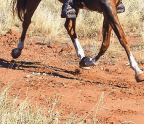Anyone who has dealt with a strangles outbreak knows the importance of biosecurity—including cleaning items of tack—in curbing the spread of the disease. While routine cleaning will kill the causal bacteria on most surfaces, a new study from Sweden shows that extra effort is required to sanitize halters and other gear made of polyester webbing.
Strangles is the common name bacteria. Affected horses can show a variety of clinical signs, including fever, nasal discharge and swollen or abscessed lymph nodes under the jaw. Infected horses may also show no clinical signs, but still harbor and spread the bacteria for weeks. Quarantine of new horses and disinfection of surfaces can reduce the risk of outbreak or contain one that has already begun.




